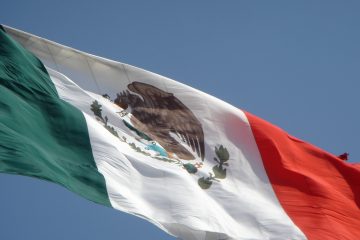OxPol Blogcast Episode 4: Mexico’s Midterm Election
Welcome to the OxPol Blogcast, a podcast where we will be sharing research, analysis, and experiences from members of the University of Oxford’s Department of Politics and International Relations. On each, episode we will talk to a guest about a piece they’ve written for the OxPol Blog. Then, we’ll discuss their larger research agenda, their insights on conducting political science, and their time at Oxford. On this episode of the OxPol BlogCast, host Chase Harrison talks to DPhil student Javier Pérez Sandoval about Mexico’s upcoming midterm election, theories of voter choices, and analysing democracy at the subnational level. Read the original blog post here: https://blog.politics.ox.ac.uk/a-return-to-the-right-for-mexico-foucaults-pendulum-and-missed-political-opportunities/ Views expressed on this podcasts are those of the guests alone and are not representative of …
A Return to the Right for Mexico? Foucault’s Pendulum and Missed Political Opportunities
In June 2021, amidst the COVID-19 pandemic, Mexico will face what is bound to be one of the most complex mid-term elections the country has seen in the last two decades. At stake is control of 15 (out of 32) governorships, 30 state legislatures, 1,900 municipalities and a complete renewal of the Lower Chamber of Congress. The outcome will clearly be either a punishment or a reward for the leftist administration of Andrés Manuel López Obrador (AMLO) and the ballots cast this summer will undoubtedly make or break the second half of his presidency. The extent to which the COVID-shock has impacted individual political preferences in Mexico remains unclear. Looking at the most recent available data to conduct an exploratory …
Will Brazil’s Past be Mexico’s Future?
For the last two decades, observers and scholars of Latin American politics have wondered about the electoral fate of the left. Some analysts in particular have highlighted how the end of the ‘Pink-tide’ precipitated the comeback of right-of-centre governments across the region. But in this regard, Mexico has been running in dissonance to its regional counterparts. The right-of-centre parties Partido Acción Nacional (PAN) and then the Partido Revolucionario Institucional (PRI) occupied the executive office from 2000 to 2018 while most Latin American countries turned to either a radical or a reformist left. Now, however, left-of-centre Andres Manuel López Obrador (AMLO) and his National Regeneration Movement (MORENA) hold the Mexican presidency. To delineate what the future might hold for AMLO, we can look to the previous experience of the …

Mexico’s Election: The Good, the Bad and the Ugly
Come Sunday at 6 p.m. (GMT-5) Mexican citizens will have had elected not only a new president, but also over 3,400 new public officials. Being the largest electoral process in Mexican history, this third federal voting round in the post-transition era determines not only Mexico’s future, but —along with several other elections in the region— it also helps configure the ideological composition of Latin America. Instead of providing an overview of the contenders or discussing the trade-offs and the potential risks of the populist left, I will a) assess the campaign, b) zero in on the topics to look out for during and after election day and lastly, I will also c) identify key challenges for the future. My assumption or rather …










